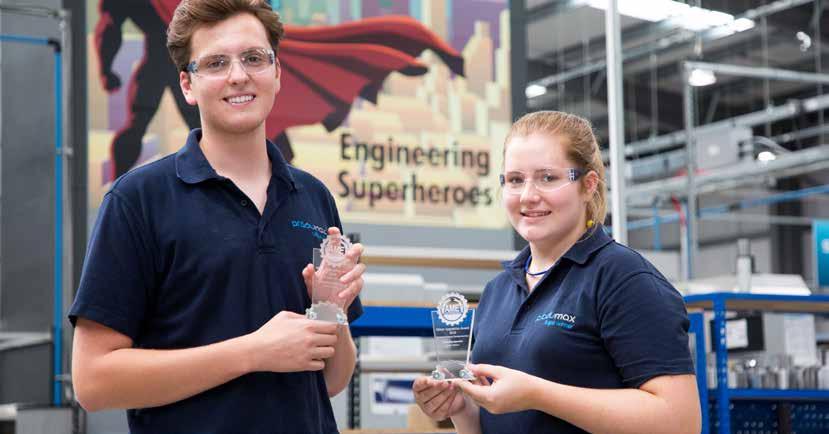
14 minute read
WELCOME TO ISSUE 14
As I reflect in our lead article, the ability to make things is the bedrock of strong economies and societies. However, in the UK, manufacturing is too often seen as “something we don’t really do much of anymore” or “a problem to be fixed”.
So, it is great to be able to highlight in this year’s IfM Review the importance of manufacturing and the contribution that IfM is making in three key areas: helping smaller manufacturers adopt appropriate digitalisation technologies; equipping people with the right skills to deploy these technologies; and improving our understanding of how to build resilient and flexible supply chains.
Advertisement
For example, Kate Price Thomas explains how Shoestring solutions have been deployed in 20 companies, helping them to build skills so they can start to digitalise using low-cost, easy-to-deploy solutions. And Alexandra Brintrup talks about how digital technologies offer huge opportunities for supply chain transformation, specifically how agentbased systems that use AI and the Internet of Things (IoT) are helping to make supply chains smarter and more efficient.
Elsewhere, we hear how a group of MPhil in Industrial Systems, Manufacture and Management students helped to transform the online offerings of 100-year-old Cambridge bakery Fitzbillies. We learn how IfM’s Complex Additive Materials Group have developed a machine learning algorithm that can detect and correct a wide variety of different errors in real time. And Veronica Martinez explains how digital twin technology is transforming the satellite industry.
There are also stories from our knowledge-transfer company, IfM Engage. We learn how roadmapping has been used to support several projects focused on innovative technologies for cancer treatment and diagnostics. In other articles, we see how insights based on IfM research enable rapid sustainability improvements and how a global aerospace company credit their collaborative journey with IfM Engage as crucial in helping them to succeed in a volatile global market.
From our Policy Links team, Jennifer Castañeda-Navarrete looks at the resilience of smaller manufacturing companies post-COVID, and Carlos López-Gómez explores what the 2023 UK Innovation Report tells us about industry trends, UK productivity and whether there is sufficient investment in R&D to underpin the UK’s aim to be an “innovation nation”.
NEW FILMS HIGHLIGHT EXTRAORDINARY IMPACT OF PARTNERSHIP BETWEEN IFM AND LOCAL HOSPITALS DURING COVID-19
As always, there is much to be proud of. Last year, a number of IfM students and staff were awarded ‘COVID Stars’ from Cambridge University Hospitals for their efforts during the pandemic. And our own Postdoctoral Awards have allowed us yet again to recognise the excellent contributions of our IfM colleagues to research, teaching and academic citizenship.
Manufacturing is vital in helping the UK, in its evolving position in the world, to become a more sustainable, resilient and equitable nation. All of us at IfM are committed to these possibilities, and I very much hope that this review of some of our recent work will inform and inspire.
IfM’s approach is always to be open and collaborative. We look forward to working with you to help manufacture a better world.
A new series of films tell the story of how IfM, Cambridge University Hospitals and Royal Papworth Hospital collaborated during the crisis – and how they built the foundation for an ongoing partnership.
At the outset of the COVID-19 crisis, hospitals across the UK needed rapidly accessible and innovative solutions to support the emerging operational challenges. In Cambridge, IfM came together with the Cambridge University Hospitals NHS Trust, (which runs Addenbrooke’s Hospital) and Royal Papworth Hospital to help them make the best use of their resources, improving hospital logistics, PPE delivery and intensive-careunit equipment development.
Three films were commissioned to highlight the key features of the partnership, as well as showcasing two of the projects, which had a positive impact on the hospitals and their patients.
The films focus on the collaborative nature of the partnership; a project to help the estates team better manage oxygen flows; and the development of a ventilator-sharing device, which enables two patients to receive tailored respiratory support at the same time.
For more information and to watch the films, scan the QR code below.
IFM STUDENTS AND STAFF AWARDED ‘COVID STARS’ FOR EFFORTS DURING PANDEMIC
Cambridge University Hospitals (CUH) awarded ‘COVID Stars’ in recognition of the outstanding contribution of colleagues and partners who showed professionalism, dedication, courage and overwhelming kindness during the COVID pandemic.
In May 2022, 31 IfM staff and students received awards from representatives of the leadership team at CUH in recognition of working with Addenbrooke’s and Papworth hospitals during the pandemic.
Dr Ewen Cameron, former Executive Director of Improvement and Transformation, and Daniel Northam Jones, Director of Strategy, from Cambridge University Hospitals NHS Trust, gave out the awards in recognition of IfM helping CUH to make the best use of their resources, streamlining logistics for sourcing and storing vital personal protective equipment (PPE), informing decision-making on emergency demand, and developing a ventilator-sharing system for use in emergencies.
Handing out the awards, Ewen explained: “In the initial phase of the pandemic we were dealing with a disease which we didn’t know how to treat, in hospitals that weren’t built for that level of respiratory virus. So, it was hugely valuable to work with IfM, who – in bringing in different perspectives and skills – helped us to solve those problems.
“They also brought a mindset of capability and a strong work ethic, meaning we were able to work quickly together, developing a deep level of trust. It has been a hugely rewarding partnership, despite dealing with some really challenging problems.”
Tim Minshall Dr John C Taylor Professor of Innovation and Head of the Institute for Manufacturing
Tim Minshall, Dr John C Taylor Professor of Innovation and Head of the Institute for Manufacturing, said: “A strong foundation in healthcare work – together with the institute’s culture of collaboration – meant IfM was able to react quickly and effectively to the COVID-19 crisis, mobilising students, staff and healthcare contacts across the city to ensure a swift and targeted response.”
As a result of the success of this work, a panel has been formed so that local hospitals and the IfM can continue to work together for mutual benefit beyond the immediate crisis of the pandemic.
Paper Examines Challenges For Quantum Technology Commercialisation
As quantum technologies rapidly mature, firms are considering how they can apply these technologies to industry and how they can innovate their business models to fully capture the opportunities and deliver value to society.
A White Paper released by IfM and the Quantum Computing & Simulation (QCS) Hub examines the landscape for quantum technologies (QT) in the UK economy, and how quantum computing and communications can best be translated into increased productivity and economic growth.
Launched at the UK National Quantum Showcase 2022, the paper finds that the UK has important strengths in QT, which can help the economy to take full advantage of quantum technologies. These strengths include being leaders in science and engineering of QT, effective funding programmes, a knowledgeable workforce in the field and a healthy start-up community.
However, challenges to adoption and commercialisation remain. The paper identifies and analyses these issues, and it recommends how best to pursue quantum technology adoption, benefiting both the economy and society in the UK.
Dominic O’Brien, QCS Hub Director and Professor of Engineering Science at Oxford University, says: “We are very pleased to have been able to collaborate with the Institute for Manufacturing in their thorough and extensive investigation into the emerging UK ecosystem. This report contains substantive recommendations worthy of serious consideration.”
Chander Velu, Head of the Cambridge Business Model Innovation Research Group and Professor of Innovation and Economics at IfM, believes a focus on new technologies like quantum is essential to enhance productivity and contribute to economic growth.
“Our study aims to better understand the enablers and barriers of business model innovation in order to accelerate quantum technology adoption. We hope our findings and recommendations will help to develop the framework needed to ensure that we get the timely benefits of quantum technologies through productivity improvement and economic growth,” he says.
To read the full White Paper and executive summary, scan this QR code:
Improving Indoor Air Quality With Twinair
IfM has begun a 3-year project as part of TwinAir, a European initiative aimed at improving indoor air quality and health.

IfM will focus on developing virtual sensors for indoor air quality by combining physical models, 3D building models and hardware sensor data to estimate pollutants.
IfM will also work on creating an automated control strategy for heating, ventilation and air conditioning (HVAC) systems to tackle the presence of pollutants as well as optimising maintenance plans for air filters in HVAC systems.
TwinAir will be implemented across six pilot sites in Europe, with demonstrations covering residential dwellings, public administration buildings, hospitals and schools, along with public transport like buses. The project aims to improve urban life by using digital twins to identify and trace pollutants and pathogens, and to automate the improvement of air quality in indoor environments. It will provide rich evidence to transport planners, facility managers and policy-makers about the factors influencing indoor air quality and effective interventions for mitigating its effects on health and wellbeing.
For further details, please contact: Dr Jorge Merino jm2210@cam.ac.uk
ENTREPRENEURS PITCH SOLUTIONS FOR OI FORUM’S ANNUAL FOOD-SECTOR COMPETITION
In December 2022, entrepreneurs, start-ups, researchers, innovators and technology developers pitched to an influential panel of decision-makers from major food, drink and FMCG firms such as Mars, PepsiCo, Diageo, Suntory, Muller, Cargill, Boots, Twinings, Yili, Nomad and Kerry.
This year’s Pitching Event focused on solutions to four of the UN’s Sustainable Development Goals, which the OI Forum members identified as having the greatest relevance to the food, drink and FMCG sectors:
• Zero Hunger
• Good Health and Wellbeing
• Responsible Consumption and Production
• Climate Action
For a full list of the 2022 winners and for more information about the OI Forum, scan this QR code:
Ifm At Digital Manufacturing Week 2022
For the fifth year in a row, IfM was the official Knowledge Partner for Digital Manufacturing Week (DMW), an event organised by The Manufacturer and which attracts thousands of manufacturers, industry leaders and technology providers, who come for expert content, peer-to-peer interaction and to discover the latest solutions and trends.
At the 2022 event in Liverpool, IfM delivered a packed schedule of masterclasses, talks and live demonstrations, helping delegates to tackle some of today’s most pressing business challenges.
With a dual-aspect exhibition space and the dedicated ‘IfM Theatre’, the IfM team, accompanied by experienced industrial associates and researchers, were on hand to provide expertise on the latest research and insights into digital and sustainability challenges. Five IfM strategic masterclasses were hosted by IfM Engage in the IfM Theatre.
At the Manufacturing Leaders’ Summit, delegates heard from high-level manufacturing speakers from around the globe. Delivering the first keynote of the Leaders’ Summit, Tim Minshall, Dr John C Taylor Professor of Innovation and Head of IfM, addressed delegates by asking: Do we need to talk differently about manufacturing?
IfM Engage’s Jennifer Castañeda-Navarrete (Policy Links Unit) and Jill MacBryde (University of Strathclyde and InterActHub) chaired a discussion panel on gender inequalities in digital manufacturing, funded by InterAct. Panellists discussed the lack of understanding of the opportunities available to women in manufacturing and the importance of increasing the visibility of role models in a wide variety of manufacturing roles – from traditional shop-floor jobs to less traditional roles associated with the industry such as HR and marketing. The panel was the first event led by the Women in Manufacturing initiative set up by a network of academics, practitioners, and professionals working in the field of manufacturing (including the IfM) in order to encourage more diversity in the sector.
From The Factory Floor To Davos
Three PhD students from IfM – Elisa Roth, Mirco Moencks and Jessica Horn – along with their supervisor, Thomas Bohné (Head of the Cyber-Human Lab at IfM), successfully facilitated a public live session at the recent World Economic Forum’s (WEF) Annual Meeting in Davos in January.
The team connected live from a Siemens factory in Germany to Davos. The session was part of the WEF’s Augmented Workforce Initiative.
With his team, Thomas Bohné co-founded and is co-leading the Augmented Workforce Initiative in collaboration with the World Economic Forum. The initiative is a multi-stakeholder community of senior executives from industry, academia, policy-making and NGOs. It embarks on a journey to jointly understand and unlock the potential of workforce augmentation for a more empowering, productive, peoplecentric, inclusive and sustainable manufacturing ecosystem.
At the meeting, Elisa Roth, in conversation with Judith Wiese (Chief People & Sustainability Officer, Member of the Managing Board, Siemens), together with operators and production managers from the Siemens factory, discussed the potential of people-centric manufacturing.
In order to remain an engine of prosperity, industry must lead the digital and sustainable transformation. People-centric production places the empowerment of the people on the factory floor at the centre of the production process and uses augmentation technologies to foster high-quality jobs, lifelong learning, accessibility and productivity.
Elisa says: “We live in a manufactured world. Everything around us has been manufactured at some point. In order to improve this world, we need to empower the people working on the factory floor. The session was a unique and exciting opportunity to share my research on how to integrate technology-enabled, lifelong learning in industry.”
The interactive session was a unique format at this year’s meeting in Davos, fostering cross-hierarchical exchange and workforce participation in order to shape the future of manufacturing in a more collaborative way.
THE “NO-EXCUSE” FRAMEWORK FOR NET ZERO MANUFACTURING INDUSTRIES
A paper released by the World Economic Forum’s Industry Net Zero Accelerator initiative offers a framework to inspire industry action towards achieving net zero.
Co-authored by Cambridge Industrial Innovation Policy (CIIP) – Knowledge Partners of the initiative – the “No-Excuse” Framework for Net Zero Manufacturing Industries and Value Chains kick starts a series of planned activities to help businesses collaborate and accelerate change across industrial sectors.
Supported by compelling stories from the industrial world, the framework provides a structure for serious discussions around net zero and aims to empower executives to make their own organisational changes. The framework recognises that, while individual organisations can make important contributions towards net zero, no company can manage the transformation of its manufacturing facilities and value chains alone. Instead, systemic collaboration is fundamental at supply-chain and cross-sectoral levels, as well as between the public and private sectors.
To download the full paper, scan the QR code below:
Scail At Ai Uk 2023
The Supply Chain AI Lab (SCAIL) at the IfM participated at AI UK 2023 in London – the UK’s national showcase of data science and artificial intelligence – with a demo of an innovative supply system which aims to significantly lower emissions from delivery vehicles.
Dr Liming Xu explains: “The demo, ‘AgentChat: Agent-based Collaborative Logistics for Carbon Reduction’, presented as part of the environment sector of AI UK 2023 showcases a collaborative logistics platform using self-driving cars. Here, intelligent software agents that act on behalf of carriers, customers and suppliers discover and negotiate truck sharing opportunities using AI algorithms, share monetary value and converge on optimal delivery routes. A physical map and its digital dashboard were developed and connected as a digital twin to visualise this cyber-physical system.”
In the real world, this system can be applied to help delivery vehicles operate more sustainably and efficiently. British roads are teeming with vehicles that transport goods between providers and consumers, and heavy goods vehicles (HGVs) are currently responsible for 19% of domestic transport emissions in the UK. Because of a lack of high-level coordination, many HGV journeys take place without much cargo, with average truck utilisation remaining around 60%.
Manufacturing Fun At The Cambridge Festival
On Saturday 18th March 2023, we hosted another successful Cambridge Festival at the IfM. This year’s event was the most well-attended since COVID-19 and attracted over 500 visitors of all ages to come learn about and play with engineering and manufacturing.
Head of the IfM, Tim Minshall, kicked off the afternoon with an engaging talk about how all the stuff around us is made, harking back to those early days of the pandemic when the vulnerability of international supply chains suddenly became obvious (remember the sudden shortage of toilet rolls?).
He went on to give the audience a peek into the amazing journeys that our things go on before they reach the shop shelves or our front doors, as well as possible ways to make those journeys shorter and more sustainable.
Several IfM research groups were represented and offered a host of activities for curious minds. The NanoManufacturing group made fragrant batteries with lemons and gherkins, and next door, Fluids in Advanced Manufacturing made lava lamps and dancing disco balls from store cupboard ingredients.
The Uk Innovation Report 2023
The findings from the 2023 edition of the UK Innovation Report, compiled by Cambridge Industrial Innovation Policy, are now available.
Among other analyses, the report looks at whether the UK is producing enough scientists and engineers, and how innovation translates into internationally competitive industries and well-paid jobs. It also provides deep dives into the food and drinks, and aerospace sectors, offering insights into the structure and performance of these UK industries.
You can read more about the report’s findings on page 34 or you can scan the QR code to download the full report.
Ifm Postdoctoral Awards 2022
Congratulations to our 2022 IfM Postdoctoral Award winners for their excellent contributions to research, teaching and academic citizenship.
The 2022 award winners are:
Excellence in Research: Dr Manuel Herrera
Excellence in Teaching: Dr Zhengyang Ling
Excellence in Academic Citizenship: Dr Siamak Kheybari, Dr Niamh Fox
Specially Commended: Dr Pratheeba Vimalnath
The IfM Postdoctoral Awards were established in 2019 in recognition of the vital role that postdocs play in driving research and innovation, delivering teaching and contributing to the academic community.
It is both efficient and sustainable to optimise the use of available space in delivery vehicles, but it is not widely done due to lack of orchestration, and the transaction cost involved in available solutions, which create a lock-in effect on carriers. Comprehensive interventions have the potential to be very impactful, given the size of the delivery industry which connects the dots of many of our supply chains. A system like the one the SCAIL team is working on can contribute to greater collaboration between delivery services – a bit like carpooling.
Head of SCAIL, Professor Alexandra Brintrup said “We urgently need a radical re-think of logistics systems in order to be able to achieve net-zero. Current delivery planning systems cannot optimise routes at the system level due to a lack of information sharing. Automation can help alleviate the manual effort involved in truck sharing, while at the same time allowing all parties to gain value from it. But logistics providers will need to get used to a new way of thinking.”
The demo will continue to be housed at the IfM, and the research group plans to develop its capabilities further with more advanced features.
With demonstrations and activities throughout the building, there was a wonderful buzz at the IfM all afternoon. Many of the younger visitors took the opportunity to share their thoughts on their way out by drawing and writing about their day. Fortunately, they seemed to enjoy it as much as we did!
New Study For The Government Office For Science Explores Opportunities For Uk Modern Industrial Biotech Beyond Human Health
A new study commissioned by the Government Office for Science (GOS) has been published by Cambridge Industrial Innovation Policy. The report, ‘Life sciences beyond human health: modern industrial biotechnology in the UK’ seeks to map and characterise the UK non-human health life science sector.
Building on the evidence base on the benefits of strengthening the UK non-human health life sciences sector in terms of economic, social and environmental gains, co-author David Leal-Ayala says: “We hope the report is a first step towards better understanding and informing strategic thinking on the opportunities for the modern industrial biotechnology sector in the UK over the coming years.”
Former Government Chief Scientific Adviser, Sir Patrick Vallance, said: “I welcome this report for shining a light on UK biotech beyond healthcare. It provides an important evidence base for government as it seeks to understand growth opportunities in this exciting and wide-ranging sector.”
Scan the QR code to download the report.









